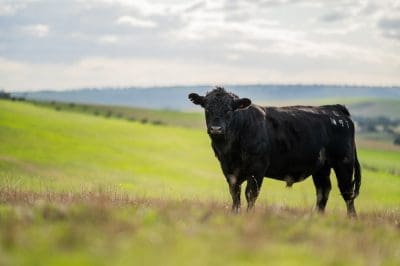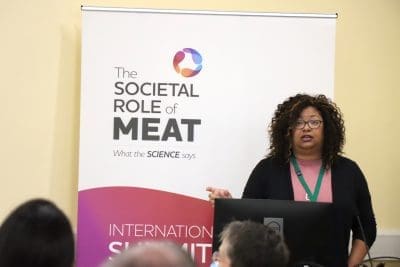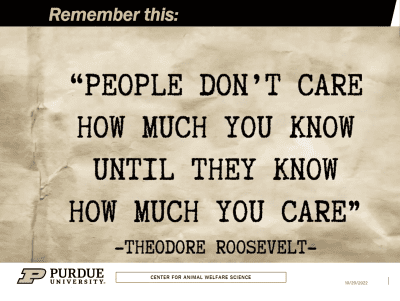In a captivating and thought-provoking presentation to the Societal Role of Meat conference in Dublin, Dr Candace Croney, director of the centre for Animal Welfare Science at Purdue University in Washington DC, was asked to talk about ethical considerations surrounding meat consumption.
The conference brought together experts from all over the world to consider claims often levelled against animal agriculture and eating meat, and to examine whether prevailing science supports such arguments or not.
Their analysis systematically demonstrated the strong scientific basis that underpins the importance of livestock and meat in balanced ecosystems and healthy diets, as highlighted in earlier Beef Central articles from the Dublin conference.
But Dr Candace Croney’s presentation took proceedings to another level by exploring one question that science on its own cannot resolve – that is, is it morally justifiable to eat meat?
While science could inform this question, it could not answer it, because it is an “ethics question”.
“Some of what I am going to tell you may make you a little bit uncomfortable,” she explained early on.
“And I hope what I am able to do is get into a conversation that I think is incredibly necessary, in order for the science to actually be heard.”
People can understand the science, but still be against eating meat
Dr Croney told the conference there is an “incredibly strong” scientific case for eating meat as had been demonstrated by previous presentations.
But it was possible for people to be fully aware of the science that supports meat consumption and still be against it, she said.
So, if the science supporting it is strong, why is meat consumption being increasingly challenged?
Dr Croney pointed to the fundamental relationships people have with animals today, which for many comprises their beloved household pets.
These relationships colour “everything they think about what we owe to animals, how we ought to treat them, how we ought to use them, and whether in fact it is appropriate today to kill them for food, and whether we may have other options”.
“If I am someone of relative affluence and my values are ‘I do not need to kill something so that I have to eat, because I don’t think that is necessary, you can give me all the science in the world, I am probably not going to change my stance on whether or not I choose to eat meat.
“And that is not something to be frustrated by, that is not something we need to deride, it is something that as scientists we need to accept and we need to think about how we use that information.
“Because at the end of the day, the question that has been posed .. is whether today meat consumption morally justified.
“And that is an ethics question.”
Moral deliberation
What is needed to effectively answer ethics questions is not debate, she said, but moral deliberation.
Debates did not work, because in essence they “produce a winner and a loser”.
“If what we want to do is have a conversation with a world that seems hostile to science, the last thing we want to do is get into debates with people, because you lose opportunities to connect with them,” she explained.
“Everyone of us here has had at least one exchange with someone, maybe someone we love… and what we often times do is, even if their point is correct, if they make us feel wrong, if they make us feel shame or they make us feel stupid, we’re not likely to want to engage that conversation further.”
Ethics were a form a moral deliberation, which is systematic and follows a process.
Stepping through the process
 Illustrating a moral deliberation process to try to answer an ethics question, she said the first step was to identify the broadest group of stakeholders impacted by an issue, and then to consider their interests, what matters to them and how they would be impacted by whatever decisions are made.
Illustrating a moral deliberation process to try to answer an ethics question, she said the first step was to identify the broadest group of stakeholders impacted by an issue, and then to consider their interests, what matters to them and how they would be impacted by whatever decisions are made.
The next step was to consider the evidence-base relevant to the question. “Here is the role of science, but what we want is full, accurate, complete science, not the science that simply serves to justify the position we’re trying to advocate.”
Arguments about competing interests and options being proposed had to be weighed and evaluated according to how adequately they addressed values related to social, ethical, scientific and economic concerns embedded in the issue.
The aim is to identify which options are “most justifiable and most preferable”.
This involves applying key ethical tests such as ‘which option will cause least harm’, ‘which option can be practically implemented’, and also ‘reversibility’. The latter is also known as ‘the golden rule concept’, and requires that the people making decisions for others consider that if the roles were reversed and someone else was making a decision for them and their own families, would they accept that decision? “Because if you wouldn’t, that does not pass the test of reversibility”.
“Those of us who have the privilege of deciding for others who may not have a voice, we should never be making decisions for other people that we would not accept for ourselves.”
In the context of the question of whether it is morally justifiable to eat meat, key tenets included:
– When the science is equivocal, questions shift to ethics. This also embodies the question of whose science to believe? (the “general rule” is that most people will believe who they already believe, Dr Croney said, and will tend to cherry pick information that validates their pre-existing beliefs.)
– Ethics questions increase with affluence (“Make no mistake about it: if we are talking about the question of ‘is it right to eat meat?’, it is because we have the luxury of choice, food security, and we are not worried about hunger”.)
– Science deemed to be coming from a place of bias and self-interest will lead to a credibility deficit.
– Avoid alienating the people you are trying to interact with and reach.
– Make concepts ‘relatable and actionable’. Talking about global hunger and feeding the world are concepts that are abstract to the average person, and beyond what they can comprehend or act upon.
– Among ‘the public’ there are many ‘diverse publics’. This includes the group that identifies as “ethical consumers”, a group that “is really driving the conversation today about what we eat, whether we should eat meat.” Members of this group think of food as more than sustenance, and as an expression of their values and their need to advocate for social justice. Despite what is sometimes reported, this group does align their behaviour and their purchasing choices with their ethics systems.
“What they tend to do is try to buy products that they think do the least harm, and avoid purchasing those that are considered to do harm, or more harm.
“They do not stop there. Because they are trying to live to their values and their ideals, they will then attempt to go a step further, and then do advocacy work.
“That is where you recruit the twitterati, you recruit Instagram and you become an extended version of advocacy for a position, and you communicate as broadly and to as many people as you possibly can, because while you cannot feed the world and you can’t wrap your mind necessarily around that, you can do your part, and your part is to purchase responsibly, and to spread the word to others.”
On the question of whether it is morally justifiable to eat meat, stakeholders include animals, the ‘public’, farmers, meat industries, policy makers, and the environment.
Questions then turn to what harm does eating meat do, and what benefits does it provide.
Arguments against meat
Prominent anti-meat voices such as Tom Regan and Peter Singer have put animals at the centre of the argument against meat eating, focusing on sentience and animal rights. Scholars related to environmental justice have also focused on the environment and the impacts on vulnerable communities and tie arguments back to human health.
Can we agree that animal suffering and death, as raised by Tom Regan and Peter Singer, are harms, Dr Croney asked? “We should be able to, we’re scientists. Death is the ultimate harm. A bad death is an even worse harm. A poor quality of life with no agency is also a harm.”
Could there be negative impacts on natural resources, local ecosystems and communities? “Again, the answer is yes. Negative impacts can happen, but also, doesn’t mean it always happens.”
Benefits of meat consumption
On the question of ethical arguments for meat consumption, there are many, Dr Croney said, including the nutritional benefits of eating meat, the naturalness argument and the cultural and historical significance of meat.
The nutritional value of meat remains a very strong argument in favour of eating meat because plant-based alternatives cannot provide the same nutrient value or bioavailability of nutrients. This may change in future if alternative protein sources improve.
Another strong case for eating meat relates to environmental constraints on food access and significant global limits on arable land available for crop production. Grasslands support grazing animals, and grasslands and the environment benefit from being grazed by those animals.
Additionally, there are parts of the world which cannot have a solely plant-based diet because their landscape does not support it. Food imports would have to go up, costs of food would increase, some would go hungry, and removing meat “would create havoc in a number of different areas”.
Dr Croney said it was critical to factor people-centred arguments into the deliberation.
Least harm principle
She also pointed to another strong argument in favour of meat consumption that she said was almost never discussed or addressed in philosophical forums she has experienced on the question of whether it is morally justifiable to eat meat.
“And it is this idea that my colleague Steve Davis put forward several years ago, and what he suggests is that in fact humans may be required to consume at least some meat, because doing so causes less harm to animals than not,” she said.
“His basic argument is that a diet that includes some meat causes less harm than a vegan diet, because when you think about the number of animals that are killed in the processing, harvesting, sowing of fields and so on, the numbers that are estimated are about 1.8 billion animals.
“If you look at the number that would be killed in a purely animal based diet, the estimates are 1.35 billion.”
“The argument that (Tom) Regan raises as part of his philosophy, the ‘Least Harm Principle’, is the idea that when you are faced with options wherein some harm is going to be done, you are required to pick the option that does the least harm.
“(Steve) Davis takes that argument and says, if we really care about animal welfare, if we look at the number of animals that are killed as the result of a purely vegan diet, there is no way that does least harm.
“We are morally obligated to at least consume some meat, if what we’re saying is that animal welfare is a priority.”
Dr Croney said the argument addresses the values of doing good and protecting from harm, and in her experience is yet to be adequately refuted by anyone.
Meat ensures equitable access to food
She said that one of the strongest arguments for meat eating today is the need to ensure equitable access to food.
“We have talked about the problems of malnutrition and that obtaining sufficient, high-quality protein is often times difficult for women and children especially in developing nations where the luxury of choice is simply not there.
“So the question I would think about is if we want to think about centering the rights of animals, which I would not argue is a bad thing, how then can we logically or morally make the case that we must deprioritise the rights of (vulnerable) people?”
“Because make no mistake about it, access to food and good quality food is a human right.
“We cannot dehumanise people in the process of advocating for animals or the environment.
“So the thing that we need to think about is it is morally responsible for the relatively affluent and food secure to advocate for positions that deny the most vulnerable in society access to the protein that they need, that they can benefit from, simply because we have the luxury to do that. And I am going to argue that it is not moral.
“And in fact there is a term for that and it is moral and cultural imperialism.
“And we don’t do that anymore in civilised society, we must strive to be consistent in our ethical principles.”
Morally defensible
In summary, the conclusion from a moral deliberation looking at the arguments for and against is that currently, meat consumption is morally defensible.
“And it is a transparent process if you look at what we prioritised and what values we said were in play.
“Retaining meat consumption with some modifications benefits the broadest group of stakeholders that includes companion animals which are so near and dear to our hearts, many of whom are obligate carnivores. Without livestock and poultry that are killed for human foods, they would not exist in our world today, except as feral animals, and we need to be clear about that.”
“It respects the broadest interests, and values we prioritized, and it reduces harm including food inequities and social inequities, and frankly some of those modifications are simply as they are pointed out, accommodations relative to how much meat is consumed, and values-oriented production attributes that people find important – animal welfare, and sustainability relative to the environment and human health,and also , food safety, quality, and equitable access to food.
“It is the ethically preferable solution based on the fact it does the least harm of the options considered, it can be practically implemented to continue to permit some meat in the diet, but maybe think about how much meat that is. This decision is publicly defensible. It also passes the reversibility test, because if we had no say in the decision making, we (and likely most people) would accept a decision to uld retain food choices and not dictate or limit them unnecessarily at this point in time while we work to find ways to better address the concerns, needs and interests involved.”
Industry’s challenge
She said it was up to the industry to make a compelling case for meat, which requires not just a rhetorical response and messaging but collaborative, interdisciplinary effort and investment in scientific advances needed to address the ethical problems.
Innovation such as cultured meat, meat-alternatives, and welfare-friendly systems are all necessary to mitigate harm and meet diverse needs, values and changing societal expectations.




Simple answer. The reason why humans eat meat is because it is the most efficient and natural source of protein and minerals for human health.
Since forever!
How many more people in the world would go hungry or even starve if we ceased meat consumption across the world, just on the basis that it is unethical? The wealthy would have access to the best and most nutritious vegan food and the rest would go hungry. Ceasing meat consumption across the world is nothing more than vegan dream, so this question is a hypothetical in the extreme.
Great thought provoking article with lots of good logic. Just need a little more explanation why a vegan diet leads to 1.8 billion animal deaths and a non vegan diet leads to 1.35 billion animal deaths. Any ideas?
Thanks for your question Marcus. Some further information here: In a 2003 paper in the Journal of Agriculture and Environmental Ethics, Steven Davis from the Department of Animal Sciences, Oregon State University, estimated that the number of animals killed in the United States to produce a plant-based diet to be around 15 field animals per hectare per year. He calculated that approximately 1.8 billion animals would be killed annually to support plant-based diets. He estimated that adopting a diet including the meat of large herbivores – specifically beef from grass-fed cattle – would result in 1.35 billion animals killed. https://link.springer.com/article/10.1023/A:1025638030686.